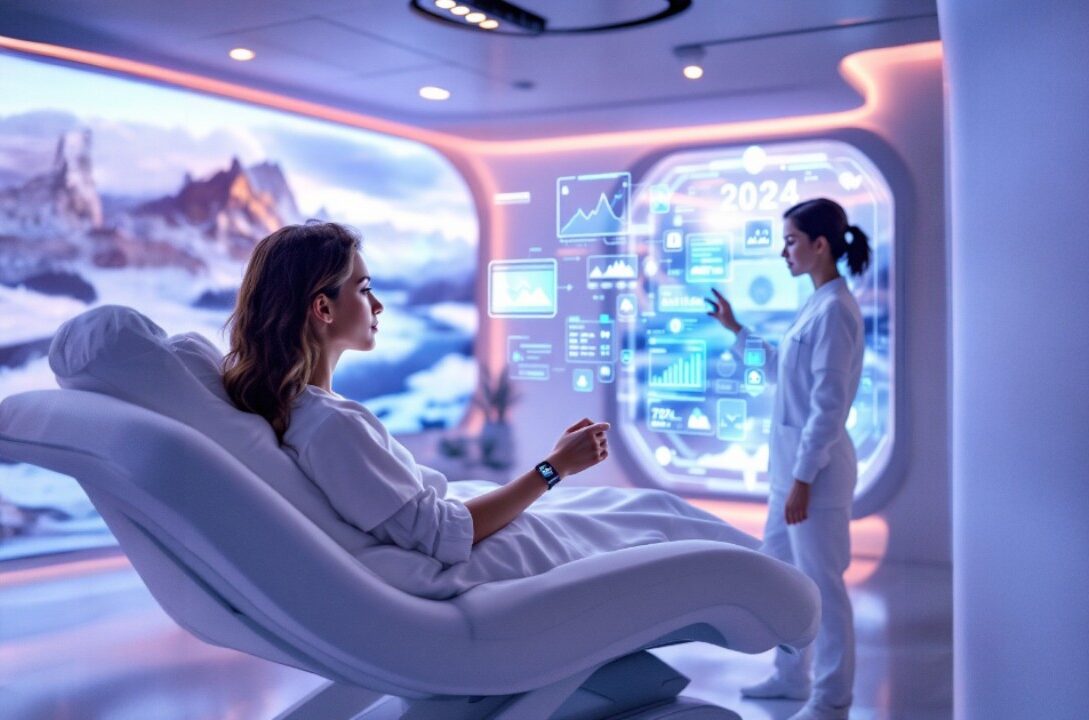The healthcare industry is evolving at an unprecedented pace, with groundbreaking advancements revolutionizing patient care, diagnostics, and treatment. In 2024, cutting-edge technologies like wearable health devices, artificial intelligence (AI), and personalized medicine are reshaping the landscape. This article explores the most impactful healthcare trends that will redefine the way we approach wellness and medical care.
The Rise of Wearable Health Tech
Wearables have become more than just fitness trackers. They are now powerful medical devices capable of monitoring heart rates, oxygen levels, blood pressure, and even detecting early signs of disease.
How Wearables Are Transforming Healthcare
- Continuous health monitoring for chronic conditions like diabetes and hypertension.
- Smartwatches with ECG capabilities detecting irregular heart rhythms.
- Remote patient monitoring (RPM) reducing hospital visits.
- Integration with telehealth, allowing real-time health tracking and consultations.
Top Wearables to Watch in 2024
- Apple Watch Ultra – Advanced heart health features.
- Fitbit Sense 2 – Stress and sleep tracking.
- Oura Ring – Personalized wellness insights.
AI-Powered Diagnostics and Predictive Healthcare
Artificial intelligence is transforming how diseases are diagnosed and prevented. AI-driven tools analyze vast amounts of medical data, identifying patterns that humans might miss.
Key AI Innovations in 2024
- AI-assisted radiology for faster and more accurate imaging results.
- Predictive analytics detecting diseases before symptoms appear.
- AI-powered chatbots providing instant medical advice and triaging patients.
Telemedicine 2.0: The New Era of Virtual Care
Telemedicine has evolved beyond video consultations. In 2024, virtual care includes:
- AI-powered diagnostics during virtual visits.
- Remote surgeries using robotic technology.
- Augmented Reality (AR) and Virtual Reality (VR) aiding in medical training and patient rehabilitation.
The Growth of Personalized Medicine
One-size-fits-all treatments are becoming obsolete. Personalized medicine tailors healthcare based on genetic, environmental, and lifestyle factors.
Advancements in Personalized Healthcare
- Genomics-driven therapies offering targeted treatment plans.
- AI analyzing DNA data to predict disease risks.
- Customized drug prescriptions minimizing side effects.
Blockchain for Secure Medical Records
Patient data security is a growing concern. Blockchain technology ensures secure, tamper-proof medical records, giving patients greater control over their health data.
Benefits of Blockchain in Healthcare
- Prevents data breaches by decentralizing records.
- Streamlines patient transfers between healthcare providers.
- Reduces fraudulent claims in medical insurance.
3D Printing in Healthcare: From Prosthetics to Organs
3D printing technology is making customized prosthetics and even human organ printing a reality.
Revolutionary Uses of 3D Printing in Medicine
- Patient-specific implants and prosthetics.
- Bio-printing tissues and organs for transplantation.
- Customized surgical tools for precision operations.
Mental Health Tech: Digital Therapies and AI Counselors
Mental health is a growing priority, and technology is playing a crucial role in providing accessible solutions.
Notable Mental Health Innovations
- AI-driven therapy apps like Woebot and Wysa.
- Virtual reality exposure therapy for PTSD and phobias.
- Wearables tracking stress levels and recommending interventions.
Robotic-Assisted Surgeries and Automation in Healthcare
Robotic technology is enhancing surgical precision and efficiency, reducing recovery times and risks.
Key Developments in Robotic Healthcare
- Da Vinci Surgical System enabling minimally invasive surgeries.
- Exoskeletons aiding in patient mobility recovery.
- Automated hospital bots assisting in medication delivery and patient care.
The Role of Big Data and AI in Disease Prevention
Big data analytics combined with AI is helping healthcare professionals predict and prevent diseases before they escalate.
How Big Data is Changing Healthcare
- Identifying health trends across populations.
- Improving early disease detection.
- Enhancing medical research and drug development.
Conclusion: The Future of Healthcare is Here
From AI-driven diagnostics to wearable health devices, the healthcare industry is undergoing a technological revolution. These trends promise better patient outcomes, improved efficiency, and personalized treatments like never before.
Are you ready for the future of healthcare? Stay informed, embrace innovation, and take charge of your health journey! 🚀
FAQs: Your Questions Answered
1. How accurate are wearable health devices?
Wearables have improved significantly, with FDA-approved devices offering clinical-grade accuracy for monitoring heart rate, ECG, and oxygen levels.
2. Will AI replace doctors in the future?
AI enhances healthcare but will not replace doctors. Instead, it assists in diagnosis and treatment planning, allowing doctors to focus on patient care.
3. Is blockchain really secure for medical records?
Yes, blockchain technology ensures tamper-proof, encrypted storage of patient data, making it one of the most secure solutions available.
4. Can 3D printing create fully functional organs?
Scientists are making significant progress, with bio-printed tissues already being used in transplants. However, fully functional organs are still in the experimental phase.
5. How will AI improve mental health treatment?
AI-driven chatbots, digital therapy platforms, and VR treatments are making mental healthcare more accessible, personalized, and effective.
Stay ahead of the curve and explore how these groundbreaking healthcare trends can shape a healthier future! 🌍💡















